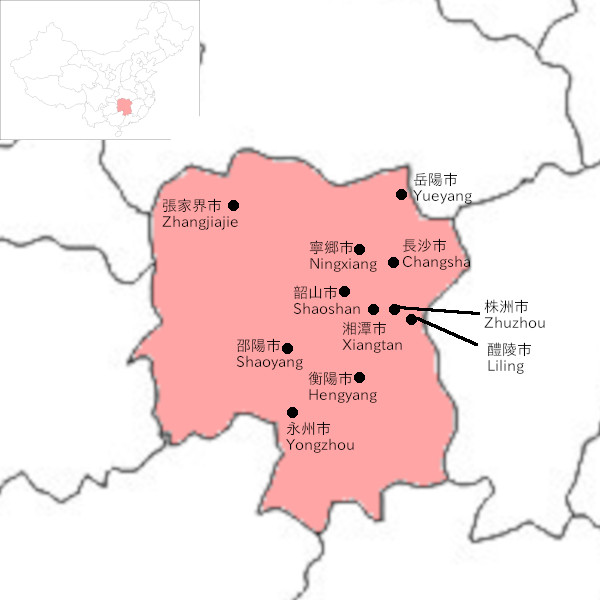TOP/UPDATES/FOUR PILLARS/CINEMA+TV/GAMES/MANGA+ANIME/MUSIC/WRITINGS/FAQ/LINKS
TOP/UPDATES/FOUR PILLARS/CINEMA+TV/GAMES/MANGA+ANIME/MUSIC/WRITINGS/FAQ/LINKS

|
|
||
|
|
|
|
| 何叔衡・He Shuheng (1876-1935) | 寧郷市 (Ningxiang) |
Taught Mao Zedong in Changsha. Early member of the Chinese Communist Party. Was with Mao during the establishment of the Chinese Soviet Republic at Ruijin in 1931. He stayed behind as a guerilla in Jiangxi during the Long March and was captured and killed by the Guomindang. |
| 趙恒惕・Zhao Hengti (1880-1971) | 衡陽市 (Hengyang) |
Military governor of Hunan from 1920-1926. Trained in Japan. Became associated with Sun Yixian's secret revolutionary group, the Tongmenghui. Supported a federalist constitution in the early Republic of China period. Mao Zedong saw him as an opportunist who did so to hold on to his own power in Hunan. Deposed during the Northern Expedition. Died in exile in Taiwan. |
| 毛沢東・Mao Zedong (1893-1976) | 韶山市 (Shaoshan) |
One of the most controversial, polarizing, and complicated leaders of the 20th century. Dictator who ruled mainland China as a communist one-party state from 1949 to his death in 1976. Responsible for rapid modernization of China, but with an immense cost to human life and freedom as the result of mismanaged economic policies and the violent, totalitarian suppression of critics and dissenters. |
| 李厚儒・Li Weihan (1896-1984) | 長沙市 (Changsha) |
Early Chinese Communist Party member and later Politburo member. After 1949, involved in activities relating to intelligence operations, economic planning, and affairs related to China's ethnic minorities. Saw his own brother purged in the Anti-Rightist Campaign. Vilified but not purged during the Cultural Revolution. Vice chairman of the Central Advisory Commission under Deng Xiaoping. |
| 彭述之・Peng Shuzhi (1896-1983) | 邵陽市 (Shaoyang) |
Early leader in the Chinese Communist Party. Politburo member from 1925-1927. Expelled in 1929 for being a Trotskyist. Fled to Vietnam, France, and finally the United States after the establishment of the People's Republic of China in 1949. Had his memoirs published in France and died in Los Angeles. |
| 賀竜・He Long (1896-1969) | 張家界市 (Zhangjiajie) |
Participated in the Nanchang Uprising. Appointed marshal of the People's Liberation Army in 1955. Supported the rehabilitation of Peng Dehuai in 1959 after he was purged for criticizing the Great Leap Forward. Purged during the Cultural Revolution. Died from intentional medical neglect while in jail. |
| 彭徳懐・Peng Dehuai (1898-1974) | 湘潭市 (Xiangtan) |
Present during the creation of the first Chinese soviet in the Jinggang Mountains. Fought against Japan in World War II and in the Korean War. Had many disagreements with Mao, especially about the Great Leap Forward. Dismissed from the Chinese Communist Party Politburo in 1959, purged in 1966, and died from intentional medical neglect in prison. Posthumously rehabilitated after Mao's death. |
| 劉少奇・Liu Shaoqi (1898-1969) | 寧郷市 (Ningxiang) |
Chinese Communist Party member who worked with Mao Zedong at Anyuan and Yan'an. High-ranking Party official. Chairman of the Republic from 1959-1968. Purged in the Cultural Revolution as the Party's "biggest capitalist." Expelled from the CCP as a traitor. Died from intentional medical neglect in prison and was buried under a false name. Posthumously rehabilitated after Mao's death. |
| 李立三・Li Lisan (1899-1967) | 醴陵市 (Liling) |
Early associate of Mao Zedong during his student years. They did not get along. Later de facto leader of the Chinese Communist Party who disagreed with Mao's guerilla strategies. He lived as an involuntary exile in Russia for 15 years after being dismissed by both the CCP and Stalin. Returned to the CCP in 1949 and held minor positions. Committed suicide during the Cultural Revolution. |
| 譚震林・Tan Zhenlin (1902-1983) | 株洲市 (Zhuzhou) |
Present at the creation of the first Chinese soviet in the Jinggang Mountains. Later vice-premier of agriculture in the People's Republic and Politburo member. Supported Great Leap Forward policies but later regretted them. Prominent February Adverse Current voice. Dropped out for the sake of self-criticism in 1967 but later re-emerged under Deng Xiaoping. |
| 任弼時・Ren Bishi (1904-1950) | 岳陽市 (Yueyang) |
Early member of Mao Zedong's Russian Studies Society in Changsha. Participated in the Long March. Later a Politburo member and high ranking member of the Chinese Communist Party. Died of a stroke. |
| 陶鋳・Tao Zhu (1908-1969) | 永州市 (Yongzhou) |
Chinese Communist Party leader in South China. Politburo Standing Committee member at the outset of the Cultural Revolution. Quickly became critical of its excesses. Purged and died of cancer in prison. Posthumously rehabilitated after Mao's death. |